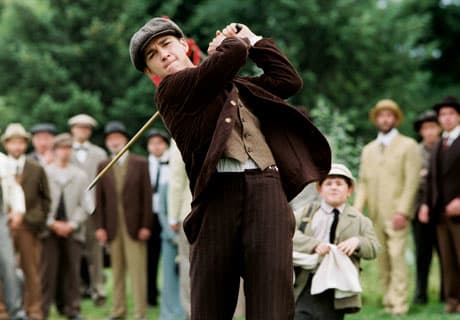The road map of the sports movie doesn't involve much variation in route or destination - only a few twists and turns along the way are allowed. Most are relatively predictable and well-marked with signage: the young upstart underdog overcoming external odds (poverty, a crap childhood, a lack of talent or opportunity), coming upon early setbacks only to power through; having a wise, older mentor who perhaps saw his own opportunity slip away; an uncommonly beautiful girl who takes a shine to you over safer, more obvious romantic choices.
But just because the path is well trod doesn't negate the worth of taking the trip - it's all in the deftness of the storytelling and the touch around the details that make, on one hand, Mighty Ducks and, on the other, Friday Night Lights. The Greatest Game Ever Played trots the path enthusiastically and with vigour but fails because it, as a film, isn't actually compelled by what it's calling "the greatest game ever," golf's 1913 U.S. Open, in which a young former golf caddy defeated England's best golfer ever in a dramatic playoff. But where The Greatest Game Ever Played falls apart is not in the dramatic milieu in which it's stewing but in a lack of respect for the inherent drama of the game of golf.
Actor-turned-director Bill Paxton (Frailty) uses every cinematic trick in the book (including the golf-movie-standard of the camera following the ball, invariably accompanied by a rushing "whoosh" sound combining wind with a jet engine). He superimposes golfers over each other hitting tee shots; he runs cameras along the putting greens and films excited crowds rushing across the town of Brookline, Massachusetts to witness the unfolding spectacle. In other words, he uses every possible means to tell us that this is an exciting event without letting the event itself be exciting.
The narrative fractures from the outset - it begins not with the hero of the piece, caddy Francis Ouimet, but with his nemesis, Englishman Harry Vardon, thus confusing our loyalties from the outset. Vardon, a low-born Englishman who had nonetheless distinguished himself in the gentleman's game, is sent to the U.S. to take the upstart nation's open cup for himself; Ouimet, meanwhile, an amateur and former caddy, has to struggle with his own impoverished upbringing and class prejudices in order to qualify for the Open himself. The David and Goliath scenario unfolds predictably, but The Greatest Game wants us to cheer not just for Ouimet (Shia LaBeouf, whose performance is the best thing here), but to sympathise on a class-struggle level with both Ouimet and his competition, Vardon, who's had similar struggles.
But where The Greatest Game fails is in making the playing of the Open palpable - we're told (again and again) that Brookline is one of the hardest courses in the United States, but in only one instance does the film bother to properly dramatise the action of playing golf. What we get instead are filmic bells and camera trick whistles designed for the same sports-illiterate audience that needs red and blue streaks to follow a hockey puck. By not respecting the inherent drama of the event itself, The Greatest Game Ever Played comes up short of par. (Disney/Buena Vista)
But just because the path is well trod doesn't negate the worth of taking the trip - it's all in the deftness of the storytelling and the touch around the details that make, on one hand, Mighty Ducks and, on the other, Friday Night Lights. The Greatest Game Ever Played trots the path enthusiastically and with vigour but fails because it, as a film, isn't actually compelled by what it's calling "the greatest game ever," golf's 1913 U.S. Open, in which a young former golf caddy defeated England's best golfer ever in a dramatic playoff. But where The Greatest Game Ever Played falls apart is not in the dramatic milieu in which it's stewing but in a lack of respect for the inherent drama of the game of golf.
Actor-turned-director Bill Paxton (Frailty) uses every cinematic trick in the book (including the golf-movie-standard of the camera following the ball, invariably accompanied by a rushing "whoosh" sound combining wind with a jet engine). He superimposes golfers over each other hitting tee shots; he runs cameras along the putting greens and films excited crowds rushing across the town of Brookline, Massachusetts to witness the unfolding spectacle. In other words, he uses every possible means to tell us that this is an exciting event without letting the event itself be exciting.
The narrative fractures from the outset - it begins not with the hero of the piece, caddy Francis Ouimet, but with his nemesis, Englishman Harry Vardon, thus confusing our loyalties from the outset. Vardon, a low-born Englishman who had nonetheless distinguished himself in the gentleman's game, is sent to the U.S. to take the upstart nation's open cup for himself; Ouimet, meanwhile, an amateur and former caddy, has to struggle with his own impoverished upbringing and class prejudices in order to qualify for the Open himself. The David and Goliath scenario unfolds predictably, but The Greatest Game wants us to cheer not just for Ouimet (Shia LaBeouf, whose performance is the best thing here), but to sympathise on a class-struggle level with both Ouimet and his competition, Vardon, who's had similar struggles.
But where The Greatest Game fails is in making the playing of the Open palpable - we're told (again and again) that Brookline is one of the hardest courses in the United States, but in only one instance does the film bother to properly dramatise the action of playing golf. What we get instead are filmic bells and camera trick whistles designed for the same sports-illiterate audience that needs red and blue streaks to follow a hockey puck. By not respecting the inherent drama of the event itself, The Greatest Game Ever Played comes up short of par. (Disney/Buena Vista)
